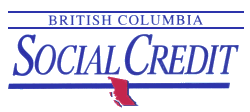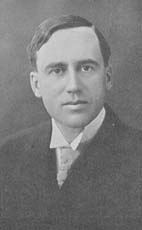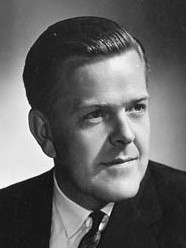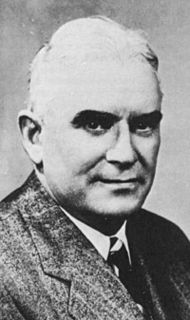The British Columbia general election of 1960 was the 26th general election in the Province of British Columbia, Canada. It was held to elect members of the Legislative Assembly of British Columbia. The election was called on August 3, 1960, and held on September 12, 1960. The new legislature met for the first time on January 26, 1961.

British Columbia is the westernmost province of Canada, located between the Pacific Ocean and the Rocky Mountains. With an estimated population of 5.016 million as of 2018, it is Canada's third-most populous province.

Canada is a country in the northern part of North America. Its ten provinces and three territories extend from the Atlantic to the Pacific and northward into the Arctic Ocean, covering 9.98 million square kilometres, making it the world's second-largest country by total area. Canada's southern border with the United States is the world's longest bi-national land border. Its capital is Ottawa, and its three largest metropolitan areas are Toronto, Montreal, and Vancouver. As a whole, Canada is sparsely populated, the majority of its land area being dominated by forest and tundra. Consequently, its population is highly urbanized, with over 80 percent of its inhabitants concentrated in large and medium-sized cities, many near the southern border. Canada's climate varies widely across its vast area, ranging from arctic weather in the north, to hot summers in the southern regions, with four distinct seasons.

The Legislative Assembly of British Columbia is one of two components of the Parliament of British Columbia, while the other is Elizabeth II, Queen of Canada, represented by the Lieutenant Governor of British Columbia.
The conservative Social Credit of Premier W.A.C. Bennett was re-elected with a majority in the legislature to a fourth term in government despite losing seven percentage points of the popular vote and seven of its seats in the legislature.

The British Columbia Social Credit Party, whose members are known as Socreds, was the governing political party of British Columbia, Canada, for all but three years between the 1952 provincial election and the 1991 election. For four decades, the party dominated the British Columbian political scene, with the only break occurring between the 1972 and 1975 elections when the New Democratic Party of British Columbia was in power.
A majority government refers to one or multiple governing parties that hold an absolute majority of seats in legislature. This is as opposed to a minority government, where the largest party in a legislature only has a plurality of seats.
The opposition Co-operative Commonwealth Federation increased both its share of the popular vote and its number of seats.
The British Columbia Liberal Party lost a small part of its popular vote, but managed to double its caucus from two to four members.
The British Columbia Liberal Party is a centre-right provincial political party in British Columbia, Canada. The base of the BC Liberal Party is made up of supporters of both the federal Liberal Party and Conservative Party, and its policies are a mixture of Liberal and Conservative. The party forms the Official Opposition. Andrew Wilkinson became leader of the party on February 3, 2018, after winning the Leadership Election on the fifth ballot, making him the Leader of the Official Opposition of British Columbia.
The Progressive Conservative Party doubled its share of the popular vote to almost 7%, but won no seats in the legislature.
The British Columbia Conservative Party, formerly the British Columbia Progressive Conservative Party, is a provincial political party in British Columbia, Canada. From the early 1900s until the 1950s, the Conservatives were, along with the British Columbia Liberal Party, one of the two major parties in the province. Since the 1950s, the party has gradually declined in prominence, last winning a seat in a 1978 by-election. The Conservatives enjoyed a brief resurgence after Liberal MLA John van Dongen joined the party in 2012, and won nearly 5% of the vote in the 2013 provincial election. The party plays a minor role in provincial politics today.

The British Columbia general election of 1996 was the thirty sixth provincial election in the Province of British Columbia, Canada. It was held to elect members of the Legislative Assembly of British Columbia. The election was called on April 30, 1996, and held on May 28, 1996. Voter turnout was 59.1 per cent of all eligible voters. The election is notable for producing a "false-winner" outcome, rewarding a party that got second in the popular vote with a majority government.

The Saskatchewan general election of 1921 was the fifth provincial election held in the Canadian province of Saskatchewan. It was held on June 9, 1921 to elect members of the Legislative Assembly of Saskatchewan.
The British Columbia general election of 1983 was the 33rd provincial election for the province of British Columbia, Canada. It was held to elect members of the Legislative Assembly of British Columbia. The election was called on April 7, 1983. The election was held on May 5, 1983. The new legislature that resulted from this election met for the first time on June 23, 1983.
The British Columbia general election of 1979 was the 32nd general election in the Province of British Columbia, Canada. It was held to elect members of the Legislative Assembly of British Columbia. The election was called on April 3, 1979. The election was held on May 10, 1979, and the new legislature met for the first time on June 6, 1979.
The British Columbia general election of 1975 was the 31st general election in the Province of British Columbia, Canada. It was held to elect members of the Legislative Assembly of British Columbia. The election was called on November 3, 1975, and held on December 11, 1975. The new legislature met for the first time on March 17, 1976.
The British Columbia general election of 1969 was the 29th general election in the Province of British Columbia, Canada. It was held to elect members of the Legislative Assembly of British Columbia. The election was called on July 21, 1969, and held on August 27, 1969. The new legislature met for the first time on January 22, 1970.
The British Columbia general election of 1966 was the 28th general election in the Province of British Columbia, Canada. It was held to elect members of the Legislative Assembly of British Columbia. The election was called on August 5, 1966 and held on September 12, 1966. The new legislature met for the first time on January 24, 1967.

The British Columbia general election of 1963 was the 27th general election in the Province of British Columbia, Canada. It was held to elect members of the Legislative Assembly of British Columbia. The election was called on August 22, 1963, and held on September 30, 1963. The new legislature met for the first time on January 23, 1964.

The British Columbia general election of 1956 was the 25th general election in the Province of British Columbia, Canada. It was held to elect members of the Legislative Assembly of British Columbia. The election was called on August 13, 1956, and held on September 19, 1956. The new legislature met for the first time on February 7, 1957.

The British Columbia general election of 1953 was the 24th general election in the Province of British Columbia, Canada. It was held to elect members of the Legislative Assembly of British Columbia. The election was called on April 10, 1953, and held on June 9, 1953. The new legislature met for the first time on September 15, 1953.

The British Columbia general election of 1949 was the 22nd general election in the Province of British Columbia, Canada. It was held to elect members of the Legislative Assembly of British Columbia. The election was called on April 16, 1949, and held on June 15, 1949. The new legislature met for the first time on February 14, 1950.
The British Columbia general election of 1937 was the nineteenth general election in the Province of British Columbia, Canada. It was held to elect members of the Legislative Assembly of British Columbia. The election was called on April 14, 1937, and held on June 1, 1937. The new legislature met for the first time on October 26, 1937.
The British Columbia general election of 1928 was the seventeenth general election in the Province of British Columbia, Canada. It was held to elect members of the Legislative Assembly of British Columbia. The election was called on June 7, 1928, and held on July 18, 1928. The new legislature met for the first time on January 22, 1929.

The British Columbia general election of 1903 was the tenth general election for the Province of British Columbia, Canada. It was held to elect members of the Legislative Assembly of British Columbia. The election was called on September 5, 1903, and held on October 3, 1903. The new legislature met for the first time on November 26, 1903.
The British Columbia general election of 1924 was the sixteenth general election in the Province of British Columbia, Canada. It was held to elect members of the Legislative Assembly of British Columbia. The election was called on May 10, 1924, and held on June 20, 1924. The new legislature met for the first time on November 3, 1924.

The British Columbia general election of 1920 was the fifteenth general election for the Province of British Columbia, Canada. It was held to elect members of the Legislative Assembly of British Columbia. The election was called on October 23, 1920, and held on December 1, 1920. The new legislature met for the first time on February 8, 1921.
The British Columbia general election of 1916 was the fourteenth general election for the Province of British Columbia, Canada. It was held to elect members of the Legislative Assembly of British Columbia. The election was called on July 5, 1916, and held on September 14, 1916. The new legislature met for the first time on March 1, 1917.
The British Columbia general election of 1912 was the thirteenth general election for the Province of British Columbia, Canada. It was held to elect members of the Legislative Assembly of British Columbia. The election was called on February 27, 1912, and held on March 28, 1912. The new legislature met for the first time on January 16, 1913.
The British Columbia general election of 1909 was the twelfth general election for the Province of British Columbia, Canada. It was held to elect members of the Legislative Assembly of British Columbia. The election was called on October 20, 1909, and held on November 25, 1909'. The new legislature met for the first time on January 20, 1910.
The British Columbia general election of 1907 was the eleventh general election for the Province of British Columbia, Canada. It was held to elect members of the Legislative Assembly of British Columbia. The election called on December 24, 1906, and held on February 2, 1907. The new legislature met for the first time on March 7, 1907.










